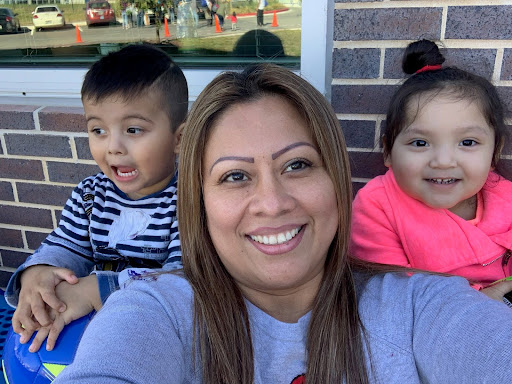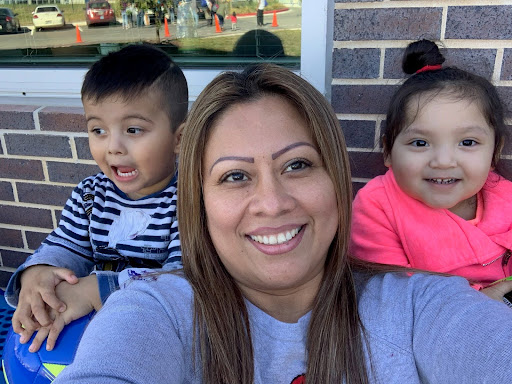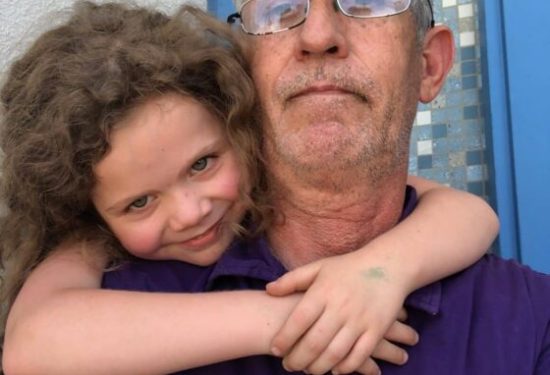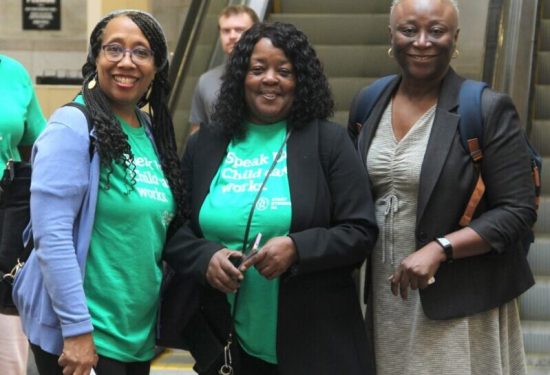Like many immigrants in the United States, I had to fight very hard for my dream to achieve a better life for me and my family. Through the years, I’ve gone through sad and complicated moments, but very beautiful things have also happened to me, which have helped me grow in my calling to be a child care provider in Austin, Texas. One of those things is the Leading from Home program, which has given me great opportunities to expand my network, access new resources, and help raise awareness of the importance of our work.
I have been taking care of children for as long as I can remember. It is a vocation that was born in me since I was little, in Guatemala. My mother had to go to work and I, as the oldest child, was left taking care of my younger sisters. I grew up fast because I was a mother and father to them. When I was 15, I started earning money by taking care of my cousins, and with that I bought the books I needed for my studies. I liked taking care of children so much that I later studied to be a nursery school teacher. At the same time, I felt the motivation to give my sisters a good future, and that is why I decided to come to the United States.
I arrived in Texas alone, without a single relative or friend to help me. I started working cleaning houses, cleaning bathrooms, trimming shirts; I worked three jobs just to have something to send to Guatemala for my sisters’ studies. My first daughter came into my life, and I continued working. Then, during a time when I stopped working, I began taking care of a child who was brought from San Marcos to my home in Austin. Then it was two children. When I had my second baby, then it was three children that I was taking care of. At that moment the pandemic began, and it was something that ironically helped me grow: with daycares closing left and right and many mothers needing to go to work, suddenly I was now caring for eight children in total, at different times of the day. It was a great challenge that forced me to learn to send emails, to use technology to communicate with parents, because before that I only knew the basics. Most importantly, it made me aware of how the world of child care worked in Austin.
I realized that there were many advantages that I could offer as a home-based child care provider. The flexibility we give parents is invaluable, including accommodating their payment and scheduling needs. Now I have children who arrive at different times of the day, some early in the morning, others that stay until 6 in the afternoon, others varying according to the parents’ schedule. We make a valuable contribution to our communities by caring for children, who are the future of our society, but also by making it possible for parents to go to work and contribute to the economy, with the peace of mind of knowing that their children are in good hands.
As part of this learning process, I got in touch with a local organization called GAVA, where I was able to meet other child care providers and continue learning by accessing resources. They were the ones who told me about Home Grown and the Leading from Home program and encouraged me to submit my application. It was a great joy when they called me to tell me that I had been accepted! I cried with emotion because I knew it was going to make a big difference in my life and in my career as a provider. The program includes a monthly stipend that at that time I really needed, in addition to training, tools, resources. I remember saying to myself, “This is a great opportunity for them to learn about us,” already thinking big in my mind.
My first year in the program as a leader was a very enriching experience: They taught me how to take care of myself, to have confidence, to access resources and tips that no one had ever given me. The financial stipend they gave me every month helped me a lot, and I was also able to help other providers. They also helped me expand my network of providers: at first there were only two of us, and now there are more than sixty, including two homes that are already registered for home-based child care, 10 licensed providers, and around 50 FFN (Family, Friend, and Neighbor) providers. We have reached these achievements with great effort.
In my second year at Leading from Home, my goals are to continue expanding my provider network, hold meetings and get-togethers, and continue working with GAVA to improve the working conditions of child care providers in Austin. There is much to do, from modifying regulations so that more providers can access permits and licenses, to raising awareness of the importance of our work. A few months ago, I was able to meet the mayor of Austin, Kirk Watson, through an assembly organized by GAVA, and discuss the support we need, funds, grants, scholarship programs and much more. Some tax concessions were achieved, but we are not done yet. We keep advocating for ourselves.
I would like that my story serves as an inspiration to other providers in Texas and the rest of the country to be part of Leading from Home. Learn more, persevere, don’t be afraid, don’t feel alone. If I could do it, you can too. By raising our voices and working as one community, we can achieve great things.




